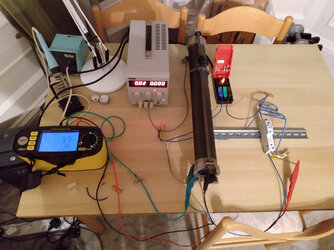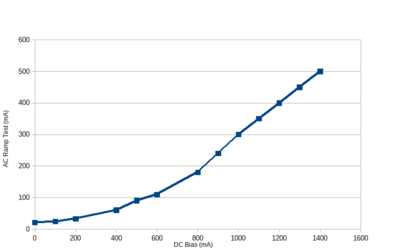A recent thread was discussing having a delay RCD (type A or AC) for TT before a garage CU with a type B RCD for an EV charger. The question was would this be OK or not? Standard advice is the type B should be direct off supply (possible problem for TT) or fed from another delay type B (at eye-watering expense). But just how sensitive are type A RCD to a small DC component, below the type B trip point, in practice?
So from the department of "don't try this at home girls & boys" I bring you some test results based on this set-up:

Test devices are unused, a year old Hager ADA106U RCBO, and a many years old PowerBreaker H92MPS RCD-FCU. The big potentiometer served to provide a resistance for the current-limited PSU to reliably run at constant current when the RCD was closed, and a path for any mains test current when the RCD opened so it would not be totally forced back through the DC PSU. For testing at home (TN-C-S with RCBOs) I used a simulated TN-C-S test rig so the PSU negative and the MFT earth both go to the pre-RCD mains neutral.
Basically I force DC through the neutral path of the RCD while doing normal MFT tests.
TL;DR Testing RCD to DC effects
So from the department of "don't try this at home girls & boys" I bring you some test results based on this set-up:

Test devices are unused, a year old Hager ADA106U RCBO, and a many years old PowerBreaker H92MPS RCD-FCU. The big potentiometer served to provide a resistance for the current-limited PSU to reliably run at constant current when the RCD was closed, and a path for any mains test current when the RCD opened so it would not be totally forced back through the DC PSU. For testing at home (TN-C-S with RCBOs) I used a simulated TN-C-S test rig so the PSU negative and the MFT earth both go to the pre-RCD mains neutral.
Basically I force DC through the neutral path of the RCD while doing normal MFT tests.
TL;DR Testing RCD to DC effects
Last edited:










